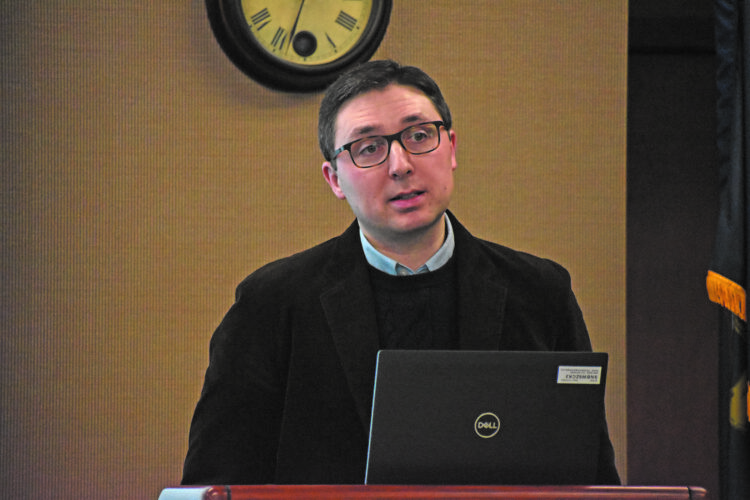Bussiness
To the rescue?: Businesses hear about aid after winter slump

Garrett Neese/Daily Mining Gazette
Leo Isleib, business development manager for the Michigan Economic Development Corp., addresses Houghton County business owners at a community briefing Friday in Houghton.
HOUGHTON — At a presentation Friday, Houghton County business owners heard about a recently opened Small Business Administration disaster loan program and other programs that could assist them in keeping their business going after an uncommonly warm winter.
The Michigan Economic Development Corporation and the Michigan Small Business Development Center hosted Friday’s briefing, held at the Lakeshore Center.
The loan program expanded to Houghton County earlier this month.
The long-term loans are available for up to 30 years, and are capped at an interest rate of 4%. No interest occurs in the first year, nor do the borrowers have to make monthly payments during that time. Loans of up to $2 million are available.
The loans are not meant to compensate for losses, but to cover working capital needs caused by the lack of snow, said Jack Camp, acting public affairs supervisor for the SBA’s Office of Disaster Recovery and Resilience.
Unlike with Ontonagon and other counties announced in March, Houghton County’s disaster loans only cover the period starting Feb. 20 and extending up to the filing deadline of Dec. 26.
“We can’t determine eligibility based on what happened in January or December,” Camp said. “… We can look forward at the working capital needs of the business.”
Instead of going through a bank, businesses can apply directly at sba.gov/disaster. The program is also open to people who have existing SBA loans.
Applicants fill out a personal financial statement and provide details about fixed debts and creditors. They can also submit an impact statement, where they explain how the disaster has impacted them financially and what things the economic losses had prevented them from doing.
“Really the overriding driver of your eligibility would be your needs,” Camp said. “If we came and said that ‘Well, based on our analysis of your sales and your profits, your eligibility is 25,000,’ and you say, ‘Well, I need 50,’ then we can do a more in-depth needs analysis of your business, to see if there is indeed more needs we need to cover.”
Houghton County had not been part of the initial group of counties declared eligible for the SBA loans back in March. Drought declarations by the U.S. Department of Agriculture already in place for those counties, such as Ontonagon County, were extended to apply for the winter.
Eligibility was expanded to Houghton County as a bordering county of Ontonagon earlier this month. Houghton’s happened through a governor’s certification, in which they determine at least five businesses have suffered substantial economic injuries.
Several people asked why Houghton’s disaster declaration only started Feb. 20; as one business owner mentioned, 75% of the snowmobile season had already passed, much of it without snow.
Leo Isleib, business development manager for the MEDC, showed maps from the U.S. Drought Monitor. Until Feb 20, when the drought maps were updated, the only portion of Ontonagon County with a high enough drought level to trigger the declaraton was a small portion on the western edge of the county, mostly consisting of public lands. Therefore, it did not meet the threshold of five affected businesses.
Businesses that apply should find out if they qualify for the loan in two to three weeks, Camp said. Once they’ve been notified of their approval, they can get the funds electronically, which would happen in about three to five business days, Camp said.
During Friday’s session, business owners also heard from MEDC Small Business Resources, Keweenaw Economic Development Alliance, Visit Keweenaw, U.P. Small Business Development Center and U.P. Michigan Works! Talent solutions.
Tammie Peterson of Peterson’s Fish Market in Hancock estimated the warm winter had reduced her winter business by 85% to 90%, forcing her to take out loans to keep the business going.
She plans to apply for the SBA loan.
“We have part of our business that opens in the summer, so we need this money to purchase the supplies, the products, the equipment that we need for the summer business,” she said.
Peterson said Friday’s session had been informative.
“It was helpful,’ she said. “It answered some questions.”








